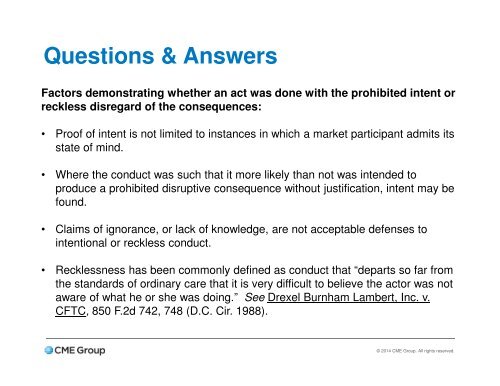Disruptive Practices Prohibited Rule (9-11-2014)
Disruptive Practices Prohibited Rule (9-11-2014)
Disruptive Practices Prohibited Rule (9-11-2014)
Create successful ePaper yourself
Turn your PDF publications into a flip-book with our unique Google optimized e-Paper software.
Questions & Answers<br />
Factors demonstrating whether an act was done with the prohibited intent or<br />
reckless disregard of the consequences:<br />
• Proof of intent is not limited to instances in which a market participant admits its<br />
state of mind.<br />
• Where the conduct was such that it more likely than not was intended to<br />
produce a prohibited disruptive consequence without justification, intent may be<br />
found.<br />
• Claims of ignorance, or lack of knowledge, are not acceptable defenses to<br />
intentional or reckless conduct.<br />
• Recklessness has been commonly defined as conduct that “departs so far from<br />
the standards of ordinary care that it is very difficult to believe the actor was not<br />
aware of what he or she was doing.” See Drexel Burnham Lambert, Inc. v.<br />
CFTC, 850 F.2d 742, 748 (D.C. Cir. 1988).<br />
© <strong>2014</strong> CME Group. All rights reserved.


